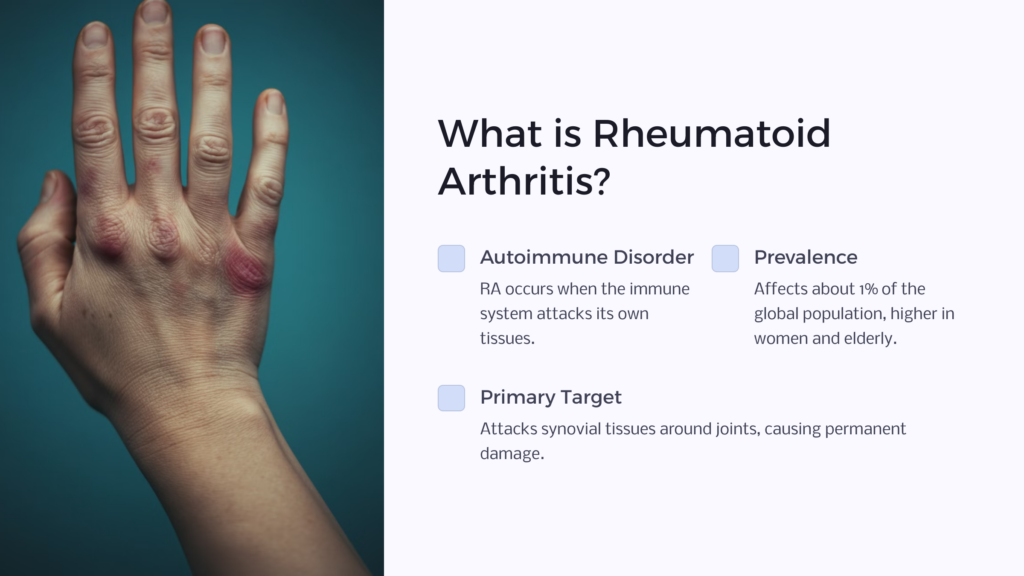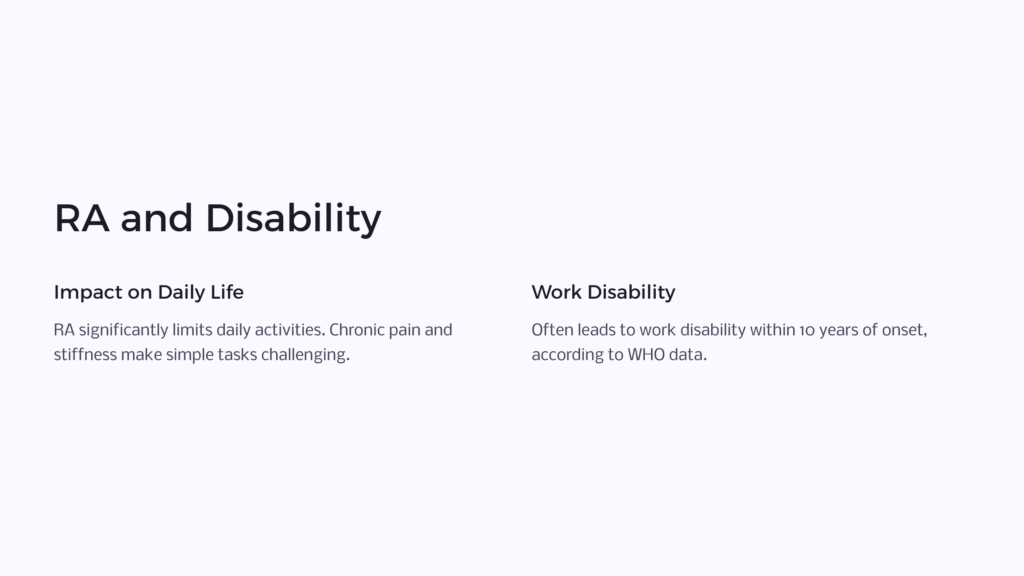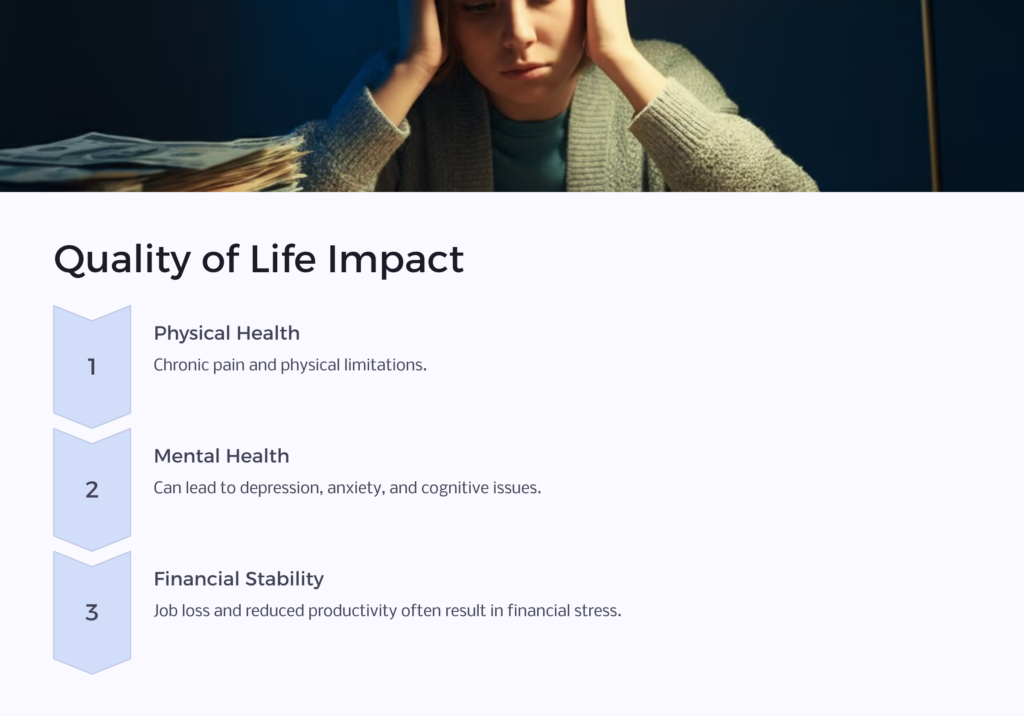Rheumatoid Arthritis (RA) is a long-term, progressive, and disabling autoimmune disease. It causes inflammation, swelling, and pain in and around the joints and other body organs. The disease typically affects hands, wrists, and knees, causing painful swelling that can eventually result in bone erosion and joint deformity. It’s a systemic disease, meaning it can affect the whole body.
RA is a common autoimmune disorder affecting about 1% of the worldwide population. Prevalence is higher among women and the elderly, and can vary across regions. This article aims to provide a comprehensive understanding of Rheumatoid Arthritis, its disabling consequences, its legal recognition as a long term disability, and how it impacts the quality of life of the sufferer.
Understanding Rheumatoid Arthritis

Rheumatoid Arthritis, by medical description, is a chronic inflammatory disorder that primarily attacks the synovial tissues around the joints. This disease develops when the body’s immune system mistakenly attacks its own tissues, resulting in prolonged inflammation that can cause permanent damage to the joints.
The exact cause of Rheumatoid Arthritis remains largely unknown. However, a combination of genetic and environmental factors is believed to trigger the immune system. Potential triggers could include infections or viruses, with certain genes increasing the risk of developing the disease.
Rheumatoid Arthritis symptoms can vary greatly from person to person and fluctuate over time. The severity of symptoms is also highly individualized. Some of the most common symptoms associated with Rheumatoid Arthritis include:
- Tender, warm, swollen joints that are painful to the touch. The joints typically affected are those in the hands, wrists, and knees. However, any joint can become inflamed.
- Morning joint stiffness that can last for hours. Many patients experience their worst stiffness after periods of inactivity such as sleeping overnight. The stiffness can make it difficult to get out of bed or grasp objects.
- Debilitating fatigue that impairs daily functioning. Fatigue from RA often does not improve with added rest.
- Low-grade fevers during disease flares. The immune system attacks the joints, causing inflammation and raised body temperature.
- Loss of appetite that leads to unintentional weight loss. RA symptoms and medications can reduce appetite.
Rheumatoid Arthritis and Disability

Rheumatoid Arthritis can significantly limit daily activities. Chronic pain, inflammation, and stiffness make it difficult for individuals to perform regular activities such as walking, standing, or even simple tasks like opening a jar.
The severity of Rheumatoid Arthritis plays a major role in determining disability. In severe cases, the disease can cause physical deformities which can further hamper mobility. Data from the World Health Organization indicates that Rheumatoid Arthritis is amongst the most debilitating diseases, often leading to work disability within 10 years after the onset of the illness.
There are countless anecdotal experiences and case studies illustrating the debilitating impact of RA. For instance, a 2015 study published in Arthritis Care & Research journal interviewed patients living with RA, revealing the harsh realities of living with the disease, from struggling with everyday tasks to coping with unwanted dependency on others.
The VA does consider Rheumatoid Arthritis as a qualifying disability based on individual cases, assessing medical records and evidence of symptoms and impairment to support veterans in need.
Making a solid Rheumatoid Arthritis disability claim takes time and diligence. But with the right approach and supporting details, you can obtain much-needed Social Security disability benefits for this challenging, lifelong condition. Perseverance and patience is key.
You first need to provide detailed medical records that show your diagnosis, symptoms, and functional limitations caused by the condition. These records should come from your rheumatologist or other doctors who have treated you.
It’s vital that you demonstrate with medical evidence how Rheumatoid Arthritis impacts your daily activities and your ability to work. Keep a journal detailing how symptoms like joint pain, stiffness, and fatigue limit your mobility, energy levels, and capacity to handle either physical or sedentary jobs. You can also submit statements from people who see firsthand how your illness affects basic tasks at home. Their observations can corroborate your own claims about reduced functionality and increase your chance of receiving Social Security disability benefits.
Begin the application process by contacting your local VA regional office, or seek assistance from a veterans service organization. Their certified officers can guide you through the disability claim procedure, ensure you have all the essential documents ready, and increase your chances of success. Remember to compile and submit all relevant medical evidence that supports your claim—test results, physician letters, treatment notes, radiology reports, and pharmacy records. Thorough documentation is key.
Lastly, Attend all C&P exam appointments arranged by the VA. Be honest with examiners about your symptoms and limitations. Follow up promptly if additional evidence is requested.
Legal Recognition of Rheumatoid Arthritis as a Disability
In many countries, including the United States, Canada, and the United Kingdom, Rheumatoid Arthritis is considered a disability due to its severe impact on everyday function. The legal framework for this recognition is often based on the significant functional limitations and impact on your daily living.
The process for being declared disabled due to Rheumatoid Arthritis involves physicians’ assessments, medical proofs, and appearances before disability determination professionals or panels. Understanding the specific application and review process in respective countries is vital to ensure proper processes are followed.
How Rheumatoid Arthritis Affects Quality of Life

Rheumatoid Arthritis can significantly affect both physical and mental health. Chronic pain, fatigue, and physical limitations can result in depression and anxiety, affecting a person’s emotional and mental wellbeing. The disease can also cause sleep problems and cognitive dysfunction.
RA can have profound effects on employment and financial stability. The physical limitations imposed by the disease frequently lead to job loss and consequently, financial stress. Reduced productivity due to illness (known as presenteeism) plagues both the individual and the employer.
Living and Coping with Rheumatoid Arthritis

There are various treatments available for managing Rheumatoid Arthritis, such as nonsteroidal anti-inflammatory drugs (NSAIDs), disease-modifying antirheumatic drugs (DMARDs), and physical therapies. These aim to slow disease progression, relieve pain, reduce inflammation, and prevent or slow joint damage.
For those living with RA, strategies to manage symptoms and maintain quality of life become crucial. This can include maintaining a balanced diet, regular exercise, stress management, and establishing a stable medication routine. Adaptive tools and resources can aid with mobility and everyday tasks.
It is also important to obtain mental health support, through therapists, support groups, or online resources. Understanding that they are not alone, and learning from others’ experiences can help individuals better cope with the disease.
Conclusion
Rheumatoid Arthritis is not just a disease, but a life-altering disability that can severely disrupt one’s ability to perform every day, ‘normal’ tasks. Understanding RA, its debilitating nature, and the mechanisms for its recognition as a disability is vital for those living with this disease, their families, healthcare providers, and employers. As with all chronic illnesses, treatment, comprehensive support, and a strong understanding are key to managing Rheumatoid Arthritis and maintaining as high a quality of life as possible.
 Benefits.com Advisors
Benefits.com Advisors
With expertise spanning local, state, and federal benefit programs, our team is dedicated to guiding individuals towards the perfect program tailored to their unique circumstances.
Rise to the top with Peak Benefits!
Join our Peak Benefits Newsletter for the latest news, resources, and offers on all things government benefits.



















